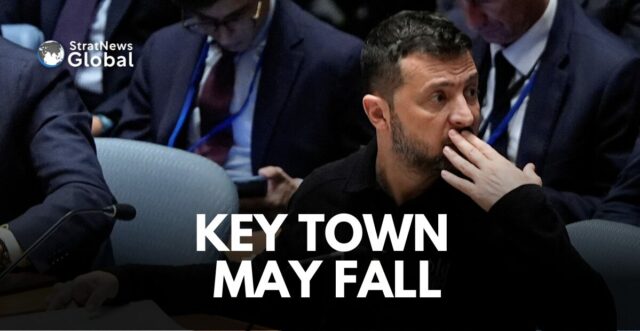Russian forces have begun storming the eastern Ukrainian town of Vuhledar, a stronghold that has resisted Russian attack since the beginning of the 2022 war, according to Russian war bloggers and state media.
Russian forces in eastern Ukraine advanced at their fastest rate in two years in August, according to multiple open source maps, even though a Ukrainian incursion into Russia’s Kursk region sought to force Moscow to divert troops.
Ukraine’s military made no reference to Russian gains around Vuhledar but acknowledged there was fighting in the area.
‘All Of Southern Ukraine’
President Vladimir Putin has said Russia’s primary tactical goal is to take the whole of the Donbas region in southeastern Ukraine. Russia controls just under a fifth of Ukraine, including about 80% of the Donbas.
Russian forces have been pushing westwards at key points along some 150 km (93 miles) of the front in the Donetsk region, with the logistics hub of Pokrovsk a key target. They captured nearby Ukrainsk on Sept. 17 and were now entering the hilltop town of Vuhledar, about 80 km (50 miles) south of Pokrovsk.
“Russian units have entered Vuhledar – the storm of the town has begun,” said Yuri Podolyaka, a Ukrainian-born, pro-Russian military blogger. Multiple pro-Russian war bloggers confirmed the attack.
Russia’s defence ministry said its forces had defeated Ukrainian units at a series of settlements including Vuhledar, which Russians call Ugledar, and that the Eastern Grouping of Russian forces had improved their tactical positions. It gave no further details on Vuhledar.
Unverified video on Russian state media showed Vuhledar, which had a population of over 14,000 before the war, under heavy artillery and aerial bombardment.
Vuhledar’s military administration did not immediately respond to a request for comment.
Attack In Vuhledar
The General Staff of the Ukrainian armed forces, in a report issued late on Tuesday, said Russian troops had launched eight attacks around Vuhledar and two nearby villages.
“As of now, our forces have repelled half the attacks. Four are still going on,” the report said.
Andriy Kovalenko, head of the Ukrainian Security Council’s Centre for Countering Disinformation, said Russia’s use of guided aerial bombs had helped it to advance in the area.
“(Vuhledar) used to be easy to defend, it is on high ground. But with the active arrival of guided aerial bombs at the front, the enemy managed to destroy it and move to the flank,” Kovalenko said. “Guided aerial bombs and aviation are the only things that allow the enemy infantry to move.”
Ukraine’s Deep State open-source intelligence analysts said on Telegram that Russian troops were trying to encircle Vuhledar and had been pummelling it with artillery and guided bombs.
Crucial Turning Point
The Russian advance westwards comes at a crucial turning point in the war.
Ukraine is seeking to win greater Western involvement in the war by securing permission to use U.S., British and French missiles for strikes into Russia, a step Putin has said would mean the West was fighting Russia directly.
U.S. Central Intelligence Agency Director William Burns cautioned in April that if the West failed to give more assistance to Ukraine, its forces would suffer more defeats on the battlefield – a development he said would embolden the West’s competitors around the world.
Neither side gives convincing casualty figures for losses. The Wall Street Journal said this month that about one million Ukrainians and Russians had been killed or wounded in the war.
The relatively swift westward advance of Russia’s forces – which have a numerical advantage – has involved encircling towns and forcing often exhausted Ukrainian troops to withdraw.
“I think that a gradual withdrawal from positions there is inevitable, given the developing trends,” Kyiv-based military analyst Oleksandr Musienko said on Tuesday, adding that Vuhledar had fulfilled its role in defence of the eastern front.
(with inputs From Reuters)





